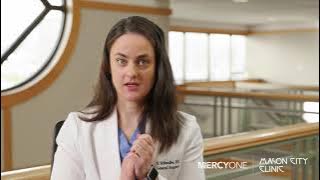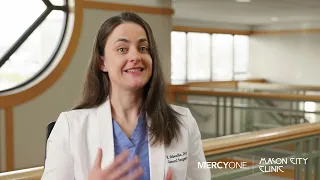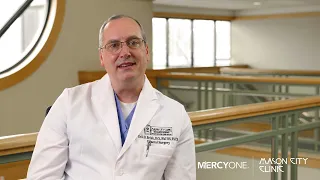View Transcript
I did have an experience in elementary school where I had an incident where one of the children in the class had a grand mal seizure. I jumped in and not really knowing how to take care of him, just held his head while he seized until he was finished. And I just realized at that time that that was something that I think I was gifted to do is to help people in crisis. I had wanted to serve my country and the Navy gave me an opportunity that would help me support my family, pay for medical school, and allow me to take care of my family.
Surgery in the Navy was mainly being a trauma surgeon. We learned a lot of damage control type surgery, surgery in combat. I have done surgery in random places, in the belly of ships. I’ve done surgeries in a tent in the desert. I have done catastrophic injuries. It grew me, it really made me have to deal with some things that I would not have been comfortable with otherwise.
Robotic and laparoscopic, the minimally invasive surgeries do tend to be a better way for the patient to recover. Smaller incisions means less pain, means that a patient’s recovery time is shortened. They’re able to get back to life more quickly. The big open surgeries do tend to take a longer recovery time in the hospital and out of the hospital, whereas the laparoscopic and robotic approaches, we can often cut that time in half.
The procedures I’m doing on the robot currently, I’m doing a lot of hernias, inguinal hernias, umbilical hernias, ventral hernias. I’m doing hiatal hernias, but we’re also doing colon resections and gallbladders. But open surgery sometimes is necessary, especially in emergent situations. You have somebody who is… Their life is threatened and speed is of the essence. It becomes important to do the best surgery at the best time for the patient.
The most important part of taking care of patients is that you enter into a relationship and a contract with them. And as I take care of them, a lot of times I’m having to give them very bad news in the beginning. And I often see myself as a beacon of hope, that this isn’t a death sentence. I’ve seen this before. I’ve treated this before. I’ll get you through this.
 Dr. Schwalbe – Minimally Invasive Surgery
Dr. Schwalbe – Minimally Invasive Surgery
 Dr. Kathryn Schwalbe, DO, General Surgeon
Dr. Kathryn Schwalbe, DO, General Surgeon
 Dr Brink talks about Pilonidal Cysts, also known as Jeep Driver Disease.
Dr Brink talks about Pilonidal Cysts, also known as Jeep Driver Disease.